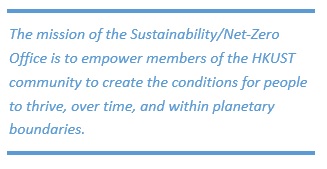Mission & Vision

HKUST is leading sustainable development through education and innovation on campus and beyond.
By adopting a living laboratory approach, we are transforming our campus into a hub for experiential learning and real-world solutions, while advancing our net-zero by 2045 goal.
From pioneering research to reducing operational impact, our community is at the heart of this transformation. We aim to shape the future of sustainable campuses and prepare future leaders to drive positive impact across society.
The Sustainability/Net-Zero Office (SUST) is committed to supporting HKUST in creating a more vibrant, inclusive, and sustainable campus to support the university's goals and priorities. Our vision is for HKUST to become a global leader by transforming our campus into a net-zero carbon, zero waste, and positive impact living laboratory for experiential learning and research within a vibrant and engaged community.

The Office is comprised of two Units to ensure attention to the areas of highest priority.
Living Lab Unit
This unit will take the responsibility for two main areas: (1) stewarding the successful implementation of the sustainability strategic plan (2028 Challenge), including a focus on accelerating our campus transition to a target of net-zero carbon emissions by 2045; and (2) transitioning SSC initiative into a stable administrative framework that can maximize our use of the campus as a living lab and provide value over the long-term.
Sustainability Strategic Plan
The university successfully completed its first sustainability master plan (HKUST 2020 Sustainability Challenge) which was launched in 2015. Our new and even more aggressive sustainability plan has a new target date of 2028. The HKUST 2028 Sustainability Challenge aligns with the university’s Strategic Plan. Similar to the 2020 Challenge, the new plan incorporates core elements in sustainability education, living lab, building our community, in addition to progress and performance.
Net-Zero Carbon
With our solid grounding in science, technology, business, and finance, HKUST has a role to play in contributing to the region’s goal of net-zero carbon by 2045. The Office coordinates with academic departments, research Institutes, and campus operations offices to drive the university’s efforts to provide a clear pathway for HKUST to exceed the net-zero carbon by 2045 target.
Campus as a Living Lab
Working with the GREAT Smart Cities institute, the Office oversees the “Campus as a living lab” framework was developed to support sustainable and smart campus projects. These projects include student-focused programs, competitions, and hands-on learning experiences to reinforce sustainable mindsets in our graduates.
Guangzhou Campus Coordination
With the new campus development in Nansha, the Office will serve as the bridge between the campuses to ensure sustainability approaches and ideas are tested, shared, and adopted on both campuses.
Experiential Learning Unit
This Unit will focus on actions and educational strategies to prepare students to meet the challenges of a carbon-constrained world through the development of resources to build sustainability-related skills and competencies. This unit will also manage the Hong Kong Jockey Club Responsible Consumer program to ensure student engagement is consistent with the learning pedagogies and priorities.
Educational Excellence
Our sustainability education priorities include an annual evaluation of our curriculum and coursework, and coordination with Schools and academic departments to ensure that all students gain a solid understanding of sustainability concepts and graduate with the capacity and commitment to solve problems locally and globally. The Office focuses on the development of tools and resources – including online, self-leaning modules – to assist students in gaining specific sustainability-related skills and competencies, such as life-cycle thinking, systems thinking, future thinking, and complex problem solving. The Unit will work with academic departments in all schools and IPO to ensure that students have ways to demonstrate their mastery of these skills in official coursework (e.g., final year projects) and unofficial activities like service learning and hackathons.
HK Jockey Club Sustainable Consumer Program
This Unit will contain the HK Jockey Club Sustainable Consumer Program, which will coordinate efforts among all eight UGC-funded universities to advance programming to train students to be smart and responsible consumers in the future. The Program will include three core focus areas – (1) Responsible Choices, (2) Responsible Consumption, and (3) Responsible Consumer Activism. These three focus areas drive an engaging and interactive series of educational and learning activities for the eight campus communities.
Positive Impact across Divisional and Regional Boundaries
The mission of the Office prioritizes empowering members of the HKUST community. This means the Office must be flexible and accommodating across all school, divisional, and administrative unit boundaries.
